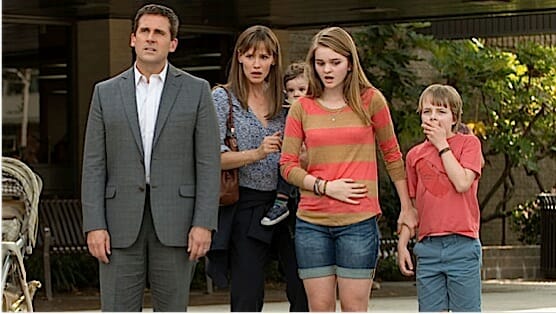
One thing should be made clear about Alexander and the Terrible, Horrible, No Good, Very Bad Day up front: it’s lying to you. Yes, this is a movie about Alexander, and yes, this is a movie about a terrible, horrible, no good, very bad day. But in Miguel Arteta’s screen adaptation of Judith Viorst’s delightfully nihilistic 1972 children’s book, Alexander Cooper’s family endures a twenty-four hour marathon of calamity while he bears witness. He’s a catalyst more than a character, barely present in the story that’s named for him.
Oh, sure, the film starts off with Alexander having what categorically qualifies as a bummer day. The kid wakes up with gum in his hair, his friends ditch his birthday party to attend a last-minute shindig thrown by the richest, coolest and dumbest kid in school, and he burns down his school’s science lab in front of his crush. But that’s just fifteen minutes out of an eighty-minute movie, and frankly they’re not the worst minutes anybody might endure in a theater this year. All the same, we feel for Alexander; he’s equally invisible at school as at home. So, in hopes of making his parents and siblings understand how he feels, he wishes for them all to have a single day as bad as his. Miraculously, it works, and almost too well, because we spend the next hour watching the rest of the Coopers suffer one ignominy after the other while a bewildered Alexander observes from the sidelines.
So Hollywood has edged Alexander out of his own movie in favor of Brick Tamland and Sydney Bristow. It’s Viorst’s original yarn in name only, but there’s a perfectly reasonable explanation as to why. Movie stars sell movies, for one, and for another, Steve Carell, Jennifer Garner, and the Terrible, Horrible, No Good, Very Bad Day doesn’t quite roll off the tongue. But by making the film about them at the expense of Ed Oxenbould’s eponymous schlemiel, Alexander becomes both a paean for the power of positive thinking and a slice of preteen wish fulfillment. On paper, that sounds lovely, and in practice it’s endearing enough. Who can really fault a movie for arguing that a chipper disposition is the best way to get through crummy times?
Maybe Viorst. Her book, after all, is about embracing the fact that we all occasionally have bad days. In Arteta’s defense, his film makes the exact same statement, but it’s hard to take him seriously when he engineers the happiest ending possible to his series of unfortunate events. Some days, you’re the pigeon. Others, you’re the statue. But most of us don’t get to have celebrities like Carell and Garner for parents, and we don’t have surprise Australian petting zoos set up in our backyards as an impromptu birthday gift. The Coopers have it rough for the run of Alexander, but in the end, they come out so far ahead that their cathartic moment of bonding, in which they each take turns kicking around trash cans, feels completely disingenuous, maybe even unearned.
Not that it matters. This isn’t the sort of movie that really demands devoted scrutiny or requires any heavy lifting from critics or audiences; it’s there, and if you’re a ten-year-old (particularly if you’re a younger or middle child), the film’s combination of pee jokes, physical gags and parental comeuppance will probably steamroll you. (Adults may find certain one-liners amusing. If nothing else, watching Garner and Carell try so hard that they both very nearly kill themselves in the process is worth something.) It’s tempting to ask for more from a movie that teaches a valuable lesson about facing life—sometimes, the world just sucks—but there’s little point; Alexander aspires to be a so-so, middlebrow, okay, very bland movie, and it succeeds in spades.
Director: Miguel Arteta
Writer: Rob Lieber (screenplay & screen story), Judith Viorst (book)
Starring: Steve Carell, Jennifer Garner, Bella Thorne, Ed Oxenbould
Release Date: Oct. 10, 2014
Boston-based critic Andy Crump has been writing about film for the web since 2009, and has been contributing to Paste since 2013. He also writes for Screen Rant and Movie Mezzanine. You can follow him on Twitter. Currently, he has given up on shaving.